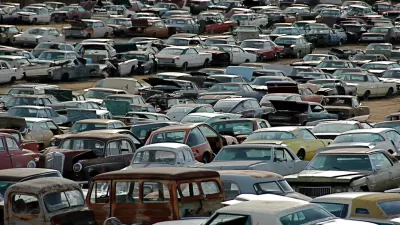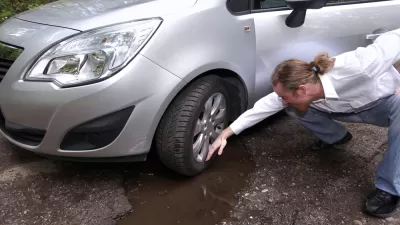The Great Recession ended in the summer of 2009. Unemployment has fallen and consumer spending has risen, as have most economic metrics save one: vehicle miles traveled. There is a list of reasons why VMT hasn't risen, and perhaps won't.

Are the signs of peak driving, i.e., peak vehicle miles traveled (VMT), here to stay or is it just an aberration and the metric will begin increasing, i.e., it is a 'lagging indicator'?
Fortune's Chris Matthews cites five reasons given by "Behind the Numbers" (sorry, subscription only, but Matthews kindly lists them) that explain why driving hasn't increased as have most metrics, e.g. gross domestic product, since the Great Recession ended. He admits to being surprised that it "has been stagnant for almost seven years" (see graph):
The only other time in history that we've seen a similarly long time between the peak and trough was following the 1982 recession, in which it took 39 months for total vehicle miles traveled to recover to its previous peak. It’s now been more than twice that amount of time since we reached the all-time high in vehicle miles driven, and unlike the case in the 1980s, we don’t have the excuse of a recent gas-tax hike to blame for it.
"So, what is going on here?" asks Matthew incredulously. "In a note to clients (August 14), independent research firm Behind the Numbers argued that we’re entering a new era in which Americans simply prefer to drive less." They write:
It’s unlikely that miles driven is a lagging indicator that will eventually return to its prior trend. There is ample evidence that a 60-year trend of increased per capita driving has ended…. Among the reasons a sharp reversal is unlikely:
- Boomers are getting older and driving less.
- Millennials are less interested in driving, and are now the largest generation in the US.
- The trend toward living near the urban core reduces the need for driving.
- Higher gas prices discourage driving.
- Mass transportation is winning over more consumers.
However, Matthews proceeds to dispel some of these reasons, and concludes by writing, "There’s plenty of reason to believe that America’s love affair with the car is beginning to cool, but it’s probably a bit early to declare this case closed."
FULL STORY: Have Americans really fallen out of love with driving?

Maui's Vacation Rental Debate Turns Ugly
Verbal attacks, misinformation campaigns and fistfights plague a high-stakes debate to convert thousands of vacation rentals into long-term housing.

Planetizen Federal Action Tracker
A weekly monitor of how Trump’s orders and actions are impacting planners and planning in America.

Chicago’s Ghost Rails
Just beneath the surface of the modern city lie the remnants of its expansive early 20th-century streetcar system.

Bend, Oregon Zoning Reforms Prioritize Small-Scale Housing
The city altered its zoning code to allow multi-family housing and eliminated parking mandates citywide.

Amtrak Cutting Jobs, Funding to High-Speed Rail
The agency plans to cut 10 percent of its workforce and has confirmed it will not fund new high-speed rail projects.

LA Denies Basic Services to Unhoused Residents
The city has repeatedly failed to respond to requests for trash pickup at encampment sites, and eliminated a program that provided mobile showers and toilets.
Urban Design for Planners 1: Software Tools
This six-course series explores essential urban design concepts using open source software and equips planners with the tools they need to participate fully in the urban design process.
Planning for Universal Design
Learn the tools for implementing Universal Design in planning regulations.
planning NEXT
Appalachian Highlands Housing Partners
Mpact (founded as Rail~Volution)
City of Camden Redevelopment Agency
City of Astoria
City of Portland
City of Laramie





























